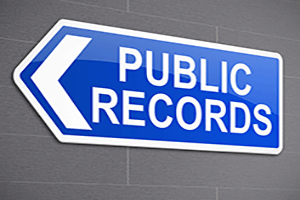Florida Public Records
Public records are a cornerstone of transparency in any democratic society because they provide citizens with access to vital information about the workings of their government. In Florida, these records encompass a wide range of documents. From court records and criminal records, to tax liens and property deeds, they offer a wealth of information. This article aims to guide you through the intricacies of Florida public records. It will help you understand what constitutes a public record in the Sunshine State. We will also show you the various ways to conduct a Florida public records search, with both online and offline methods.
What Constitutes a Florida Public Record?
Florida public records, as defined by Chapter 119 of the Florida Statutes, covers most all documents and information made or received by an agency in connection with it's official business. These records are used to perpetuate, communicate, or formalize knowledge. These can include documents, papers, letters, maps, books, tapes, photographs, films, audio recordings, and more. Essentially, if it's used to conduct government business, it's likely a public record.
The Florida Department of State has an important role in managing these records. They organize and make sure they are properly recorded and archived for public access. However, not all records are public. Some are exempt from public disclosure under specific statutes. These exemptions are designed to protect sensitive information and the privacy of individuals.
Types of Public Records in Florida
Florida public records cover a wide range of information. They provide a wealth of data about the state's operations, and the information collected about it's citizens. Some of the various types of public records available in Florida include court records, criminal records, driving records, property records, and vital records. Each type of record serves a different purpose and provides unique insights.
Here are some of the most common types of public records that are commonly requested:
1). Court records and legal documents, including both civil and criminal
2). Criminal records including arrests, convictions, incarcerations, sex offenders, and warrants
3). Driving records that include driver records, traffic citations, DUIs and driving record points
4). Vehicle records such as vehicle history reports, accidents, recalls, and vehicle title information
5). Property and land records including sales, deeds, and liens
6). Certain financial records such as bankruptcies and tax liens
7). Vital records that include birth, death, marriage, and divorce records
8). Government meeting minutes and state and local planning
9). Personal information such as names, physical addresses, email addresses, and phone numbers
10). Business records such as filings, articles of incorporation, registered agents, licensing, and DBAs
Public Court Records and Legal Documents
Court records are a significant part of Florida's public records. They include case files, dockets, judgments, and other legal documents. These records provide insights into the legal proceedings that take place in the state. They are essential for legal professionals, journalists, researchers, and anyone interested in the state's legal system. Access to these records can be obtained through the FL Courts E-Filing Portal or by visiting the Clerk of the Circuit Court in the relevant county.
Public Property and Land Records
Property and land records are another common type of public record in the state. They include deeds, mortgages, liens, plats, and tax records. These records provide information about property ownership, property value, and property tax payments. They are useful for real estate professionals, potential home buyers, and researchers. Access to these records can be obtained through the county property appraiser's office, the county clerk's office, or the Bureau of Survey and Mapping.
Public Vital Records: Birth, Death, Marriage, and Divorce
Vital records include birth certificates, death certificates, marriage licenses, and divorce decrees. These documents are recorded information about the life events within the state. They are essential for genealogical research, verifying identity, and legal proceedings. Access to these records can be obtained through the Department of Health's Bureau of Vital Statistics.
How to Conduct a Florida Public Records Search
Conducting a Florida public records search can be done in several ways. The method you choose depends on the type of record you're looking for and your personal preference. The two primary methods are online searches and in-person requests. Both methods have their advantages and can yield the information you need. While most FL public records are available online, official or certified copies may require an in person visit to verify your identity.
Here are the steps to conduct a Florida public records search:
1). Identify the type of record you need.
2). Determine the appropriate government agency or office.
3). Use the online search tool or visit the office in person.
4). Submit a request for the record.
5). Pay any applicable fees.
6). Wait for the record to be retrieved and provided to you.
Understanding Florida's Public Record Laws
Florida's public record laws are designed to promote transparency in government. They give citizens the right to access public records without stating a purpose. The main law governing public information in Florida is Chapter 119 of the State Statutes, also known as the Sunshine Law. This law outlines the types of records that are public, how they can be accessed, and the fees associated with accessing them.
Here are some key points about these laws:
1). It applies to all state, county, and municipal records.
2). It requires agencies to provide records within a reasonable time.
3). It allows agencies to charge a fee for the cost of retrieving and copying records.
4). It provides penalties for agencies that fail to comply with the law.
The Florida Sunshine Law and Its Impact
The Sunshine Law is another important aspect of the state's public record laws. This law requires government meetings to be open to the public and the records of these meetings to be accessible. The Sunshine Law also promotes transparency by allowing citizens to see how decisions are made. It also holds government officials accountable for their actions. Violations of the Sunshine Law can result in penalties, including fines and removal from office.
While public record laws promote transparency, they also recognize the need for privacy. Certain information is exempt from public access to protect individuals' privacy and security. Exemptions include personal information like social security numbers, medical records, and certain law enforcement records. These exemptions are outlined in the Florida Statutes. If a record contains both public and exempt information, the exempt information must be redacted before the record is provided.
Privacy Restrictions and Public Access To Records
Florida's public record laws strike a balance between transparency and privacy. While they promote open access to government records, they also protect sensitive information. The laws recognize that certain information, if made public, could harm individuals or compromise security. Therefore, they provide exemptions for such information.
Balancing transparency with privacy is a key aspect of the state's public record laws. The laws aim to promote open government while also protecting individuals' privacy. This balance is achieved through exemptions, which protect sensitive information from general access.
Privacy in publicly available records is protected through exemptions. These exemptions prevent sensitive information from being disclosed. When a certain record contains exempt information, that information must be redacted before the record is provided. This ensures that privacy is protected while still promoting transparency.


